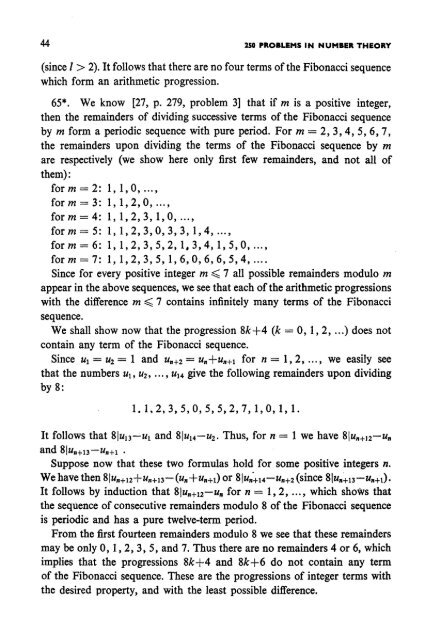250 Problems in Elementary Number Theory - Sierpinski (1970)
250 Problems in Elementary Number Theory - Sierpinski (1970)
250 Problems in Elementary Number Theory - Sierpinski (1970)
- No tags were found...
You also want an ePaper? Increase the reach of your titles
YUMPU automatically turns print PDFs into web optimized ePapers that Google loves.
44 <strong>250</strong> PROBLEMS IN NUMBER THEORY(s<strong>in</strong>ce 1 > 2). It follows that there are no four terms of the Fibonacci sequencewhich form an arithmetic progression.65*. We know [27, p. 279, problem 3] that if m is a positive <strong>in</strong>teger,then the rema<strong>in</strong>ders of divid<strong>in</strong>g successive terms of the Fibonacci sequenceby m form a periodic sequence with pure period. For m = 2, 3, 4, 5, 6, 7,the rema<strong>in</strong>ders upon divid<strong>in</strong>g the terms of the Fibonacci sequence by mare respectively (we show here only first few rema<strong>in</strong>ders, and not all ofthem):for m = 2: 1, 1, 0, ... ,for m = 3: 1, 1, 2, 0, ... ,for m = 4: 1, 1, 2, 3, 1,0, ... ,for m = 5: 1, 1, 2, 3, 0, 3, 3, 1, 4, ... ,for m = 6: 1, 1, 2, 3, 5, 2, 1, 3, 4, 1, 5, 0, ... ,for m = 7: 1, 1, 2, 3, 5, 1, 6, 0, 6, 6, 5, 4, ... .S<strong>in</strong>ce for every positive <strong>in</strong>teger m ~ 7 all possible rema<strong>in</strong>ders modulo mappear <strong>in</strong> the above sequences, we see that each of the arithmetic progressionswith the difference m ~ 7 conta<strong>in</strong>s <strong>in</strong>f<strong>in</strong>itely many terms of the Fibonaccisequence.We shall show now that the progression 8k+4 (k = 0, 1, 2, ... ) does notconta<strong>in</strong> any term of the Fibonacci sequence.S<strong>in</strong>ce Ul = U2 = 1 and U,,+2 = U,,+Un+l for n = 1, 2, ... , we easily seethat the numbers Ul, U2, ... , U14 give the follow<strong>in</strong>g rema<strong>in</strong>ders upon divid<strong>in</strong>gby 8:1. 1. 2, 3, 5, 0, 5, 5,2, 7, 1, 0, 1, 1.It follows that 81u13~Ul and 8IuI4-u2. Thus, for n· = 1 we have 8Iu"+12-unand 8Iu"+13-U"+1 .Suppose now that these two formulas hold for some positive <strong>in</strong>tegers n.We have then 8Iun+12+U,,+13-(U,,+Un+1) or 8Iu,,:"14-Un+2 (s<strong>in</strong>ce 8Iun~13-U"+I).It follows by <strong>in</strong>duction that 8Iun+12-u" for n = 1, 2, ... , which shows thatthe sequence of consecutive rema<strong>in</strong>ders modulo 8 of the Fibonacci sequenceis periodic and has a pure twelve-term period.From the first fourteen rema<strong>in</strong>ders modulo 8 we see that these rema<strong>in</strong>dersmay be only 0, 1, 2, 3, 5, and 7. Thus there are no rema<strong>in</strong>ders 4 or 6, whichimplies that the progressions 8k+4 and 8k+6 do not conta<strong>in</strong> any termof the Fibonacci sequence. These are the progressions of <strong>in</strong>teger terms withthe desired property, and with the least possible difference.


